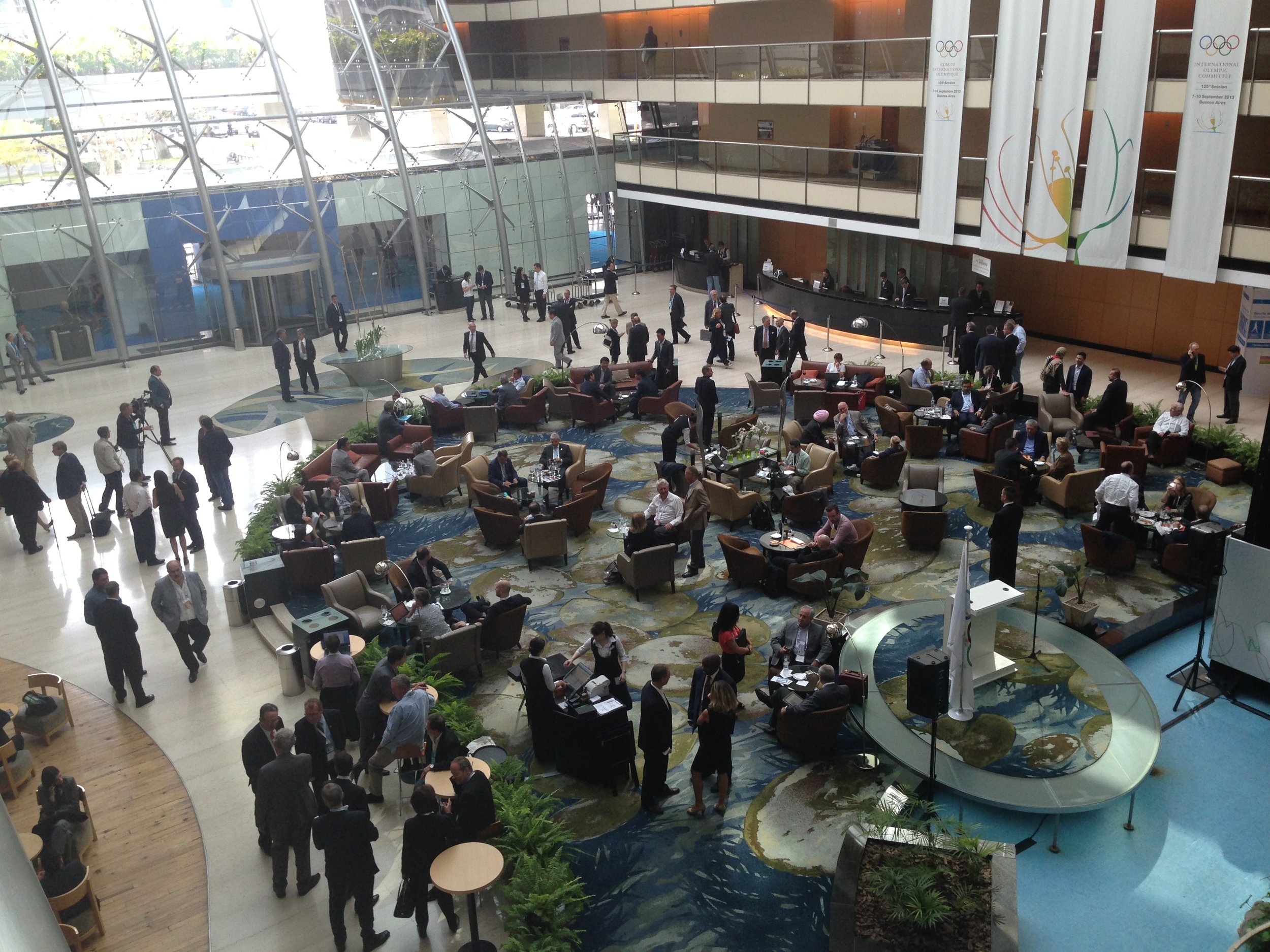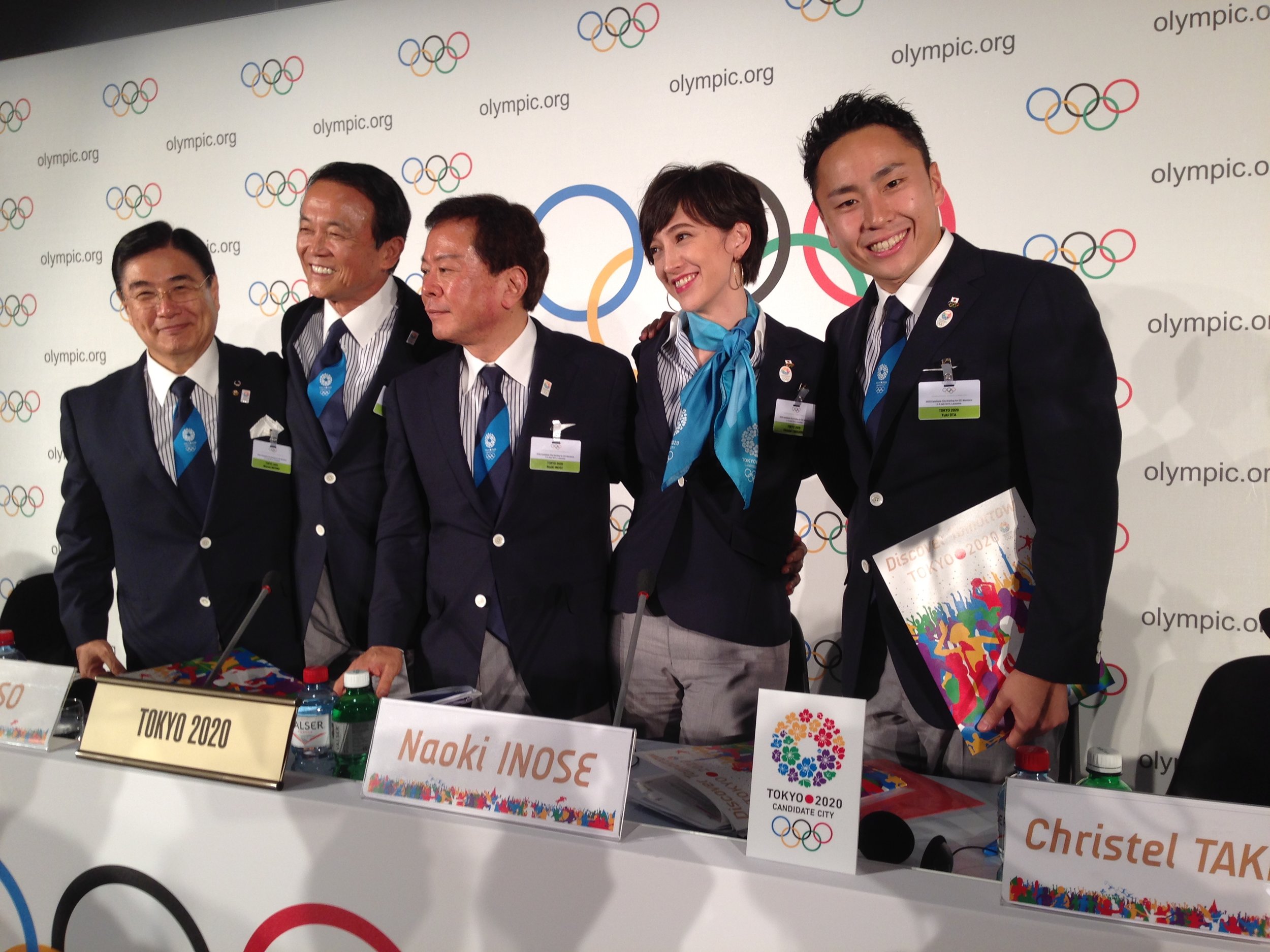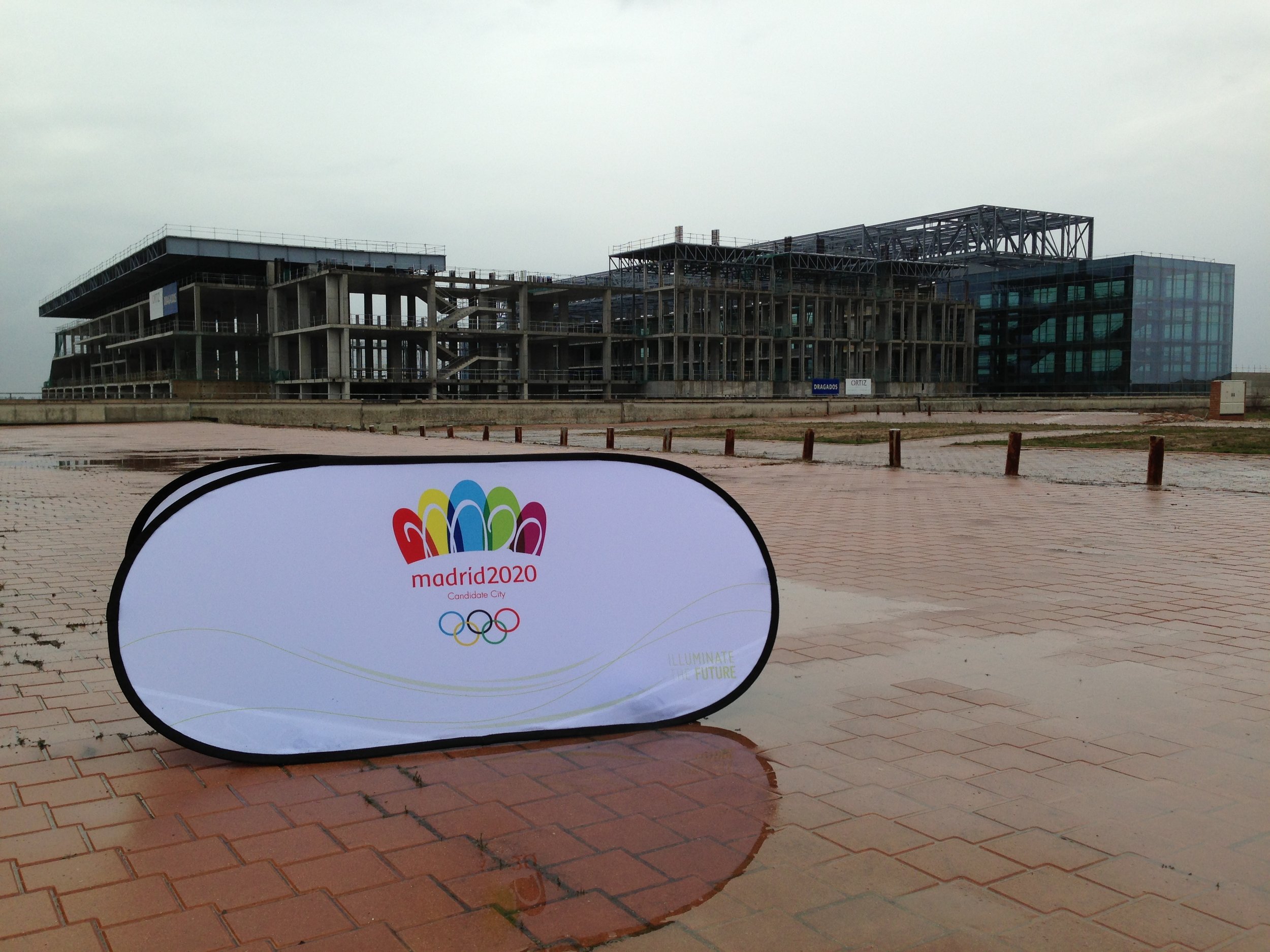BUENOS AIRES -- As circuses go, this one is most excellent. The question: who will be the next ringleader and where is the next tent to be pitched? Here Friday morning in the corner of the Hilton Hotel lobby one could see Thomas Bach of Germany, the International Olympic Committee vice president running for the top job, talking very, very quietly with Cuba's Reynaldo González López.
A few feet away, in the main hotel lobby, Her Imperial Highness Takamado of Japan held court, meeting first with Italy's Ottavio Cinquanta, president of the international skating federation, then with His Royal Highness Prince Feisal al Hussein of Jordan.
On the big screen set up just a few more feet away, the international wrestling federation's press conference got underway, the changes the IOC had sought to see from the federation dramatically evident on the dais -- here were two female wrestlers along with the new FILA president, Serbia's Nenad Lalovic.
Speaking of royalty -- here was His Imperial Basketball Highness, the former Sacramento King, Vlade Divac, near the front door, now the president of the Serbian national Olympic committee. His luggage had been lost on the way down to Buenos Aires. What was a really tall guy to do in such a situation?
You want a story? Every few feet, every different huddle held a different story, the soundtrack of the entire thing encapsulated in George Thorogood's brilliant tour de force: who do you love?
The scramble for votes was on in full force as the landmark 125th IOC session got underway Friday night.
The 2020 vote goes down Saturday. Tokyo and Madrid seemed the likeliest choices. That said, no one was by any means willing to rule Istanbul out, and its supporters insisted they were very much still in it.
With apologies to Divac and mixed metaphors, wrestling seemed all but a slam-dunk certainty to be reinstated in voting Sunday to the 2020 program.
Los Angeles Lakers alert! Here was Divac, who of course played for L.A. before exile to Charlotte and Sacramento and then a last season in Los Angeles. Was that Pau Gasol? The current Laker big man is part of the Madrid team.
The intrigue underpinning the sports vote: which of the other two, baseball/softball or squash, will run second? Due to a quirk in the calendar, the next IOC session comes just five months from now, in Sochi in February. An entirely plausible scenario floating in the ether had it that an exception could well be carved out -- there being a new president and all -- for the runner-up here to be added to the program come 2020.
Everyone close to the Olympic scene -- repeat, everyone -- acknowledges that the process by which wrestling was first dropped and now appears on the verge of being reinstated needs wholesale review.
If Tokyo wins, imagine how easy it would be to imagine adding baseball/softball to the program.
Or adding squash, no matter which of the cities prevails.
The presidential vote -- which trumps all others, with six candidates -- happens Tuesday. That means Monday, an off day if you will, is likely to be rife with all manner of speculation, rumor, gossip and prevarications. Joining Bach on the ballot: C.K. Wu of Chinese Taipei; Richard Carrión of Puerto Rico; Ser Miang Ng of Singapore; Sergei Bubka of Ukraine; Denis Oswald of Switzerland.
IOC presidential elections have traditionally been subdued affairs. In the 24/7, TMZ-style world in which we now live, with camera crews scrambling for any image, the IOC is determined to keep it subdued.
This is the challenge:
The IOC received 1,846 media requests. A full 600 came from Japan; 300 from Spain; 180 from Turkey.
On Thursday, Bubka, the 1980s and '90s pole-vault champion who is now the head of his nation's Olympic committee and a vice president of the track and field international governing body, was sitting near where Bach would find himself Friday. When Bubka got up, that so stirred the camera crews that they madly began clicking and clacking.
This so unnerved the security and hotel staff that they thereupon drew the shades.
On Friday morning, the shades were still down.
This makes for an apt -- here comes that word again -- metaphor. The IOC votes in secret.
Thus here is the one absolute truth about such IOC elections:
The only thing predictable about an IOC election is that it is entirely unpredictable.
The candidate city votes happen every other year. The presidential vote is a generational thing -- every eight or 12 years, depending.
About the outcomes of either or both, this means -- as was sagely noted in the lobby -- the following:
Some people are guessing. Some pretend to know. Some assume. Some hope. No one knows.
A great many people are only too happy to lie, or maybe at least stretch the truth, or not just do what their kindergarten teacher would find wholesome.
Why do they act this way?
That's easy.
Because they can.
A skeptic would say the system encourages the members to be unaccountable.
Perhaps.
In truth, one figures out fairly consistently who votes for what -- though, to be fair, not with 100 percent accuracy. The IOC is a club, and clubs have certain discretions. What keeps the members accountable is that -- this is for real -- they are accountable to each other. Because there are votes for bid cities every two years, and votes for the policy-making executive board every year, there are favors and counter-favors and so on. One screws someone else at one's peril because, sooner or later, it comes back to haunt you.
The 2018 vote, won by Pyeongchang, was a runaway, which pretty much everyone -- except for a few affiliated with runner-up Munich -- knew going in.
The 2016 vote, won by Rio de Janeiro, was also a runaway, which Rio knew, even if others did not.
This 2020 vote does not appear to have a clear favorite. Thus the tension Friday in the Hilton lobby was very, very real, and theories fast and furious.
Right now there are, including the outgoing president Jacques Rogge, 103 IOC members. He does not vote. That means the vote count is a maximum 102. It likely will prove less because some members won't show up -- because of illness or duties of business or state -- and because of IOC rules that prevent a member from Country X for voting from a candidate from the same nation. It is widely assumed that the winning vote total here -- majority plus one -- is going to be 48 or 49.
Because the balloting is secret, the members cheerfully tell each other whatever. In tallying up support, the denominator of 100 votes can quickly seem more like 200, indeed -- laughably -- more like 300.
"I support you," in IOC jargon, it must be understood, does not mean, "I'm going to vote for you."
"You have my vote," does not mean "in a round you want me to." Or "any particular round."
Indeed, in 2009, in balloting for the 2016 Summer Games site, the U.S. Olympic Committee felt sure before voting commenced that it had more than 30 rock-solid votes in the first round for Chicago. To the USOC's surprise, Chicago was booted in the first round with but 18 votes.
This is why, as one of the presidential contenders, surveying the scene Friday mid-afternoon, said, "Who the heck knows?" And he didn't say "heck."
This was a little bit after Kuwait's Sheikh Ahmad al-Fahad al-Sabah, the head of the Assn. of National Olympic Committees, walked in the lobby and the center of gravity seemed to shift, all eyes turning the sheik's direction. As has been speculated many times since he has become one of the Olympic world's most influential figures, with no definitive answer: how many votes does his excellency truly "control"? Any? Many?
As for the sheikh and 2020:
Does he support Tokyo? After all, he is also the longtime head of the Olympic Council of Asia. Within Olympic circles, it is hardly a secret that Tsunekazu Takeda, Japan's IOC member and the leader of the Tokyo 2020 bid, has been known to ride with the sheikh to important meetings on the sheikh's private plane.
Does he back Madrid? He and Alejandro Blanco, the head of the Spanish Olympic Committee, are known to be close through an association with Marius Vizer, president of the International Judo Federation and, as well, the recently elected head of SportAccord, the umbrella organization for the international sports federations.
Or might the sheikh prefer Istanbul? An Istanbul win probably knocks Doha, Qatar, out of the running for the Summer Games for many years. Given the intricacies of politics in the Middle East, might the sheikh find that a play worth exploring?
The sheikh is believed to be a supporter of Bach's presidential candidacy. Ultimately -- will he be?
The sheikh likes, most of all, winning.
Actually, two more things can be said for certain about an IOC election:
One, Fidel Castro's son, Antonio, is here, lobbying for the baseball/softball project. His translator speaks English so beautifully that Shakespeare himself might want to give a listen.
Two, Sheikh Ahmad controls his own vote.














